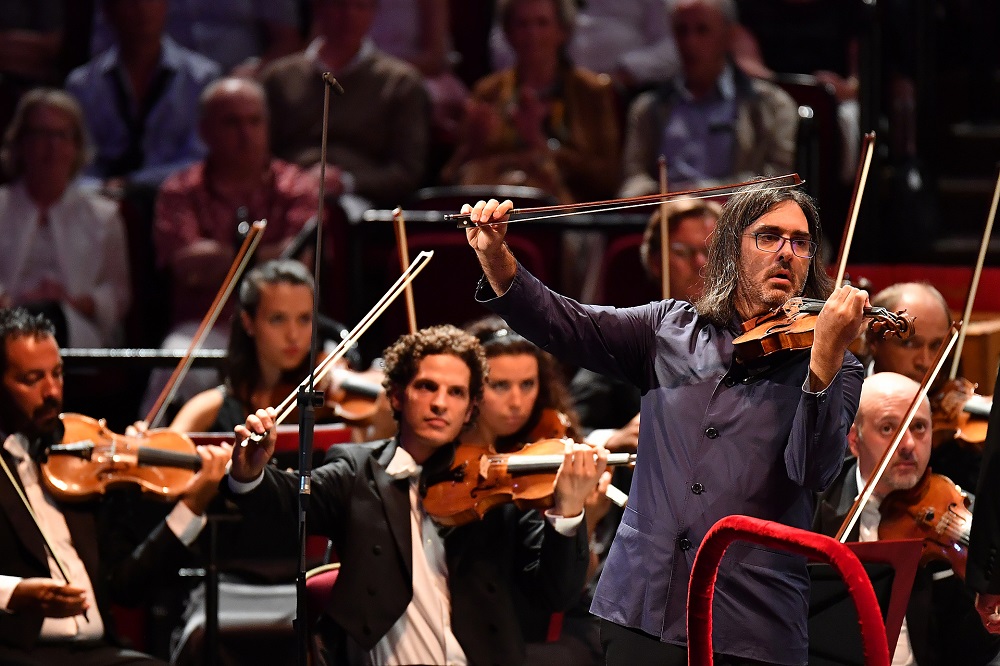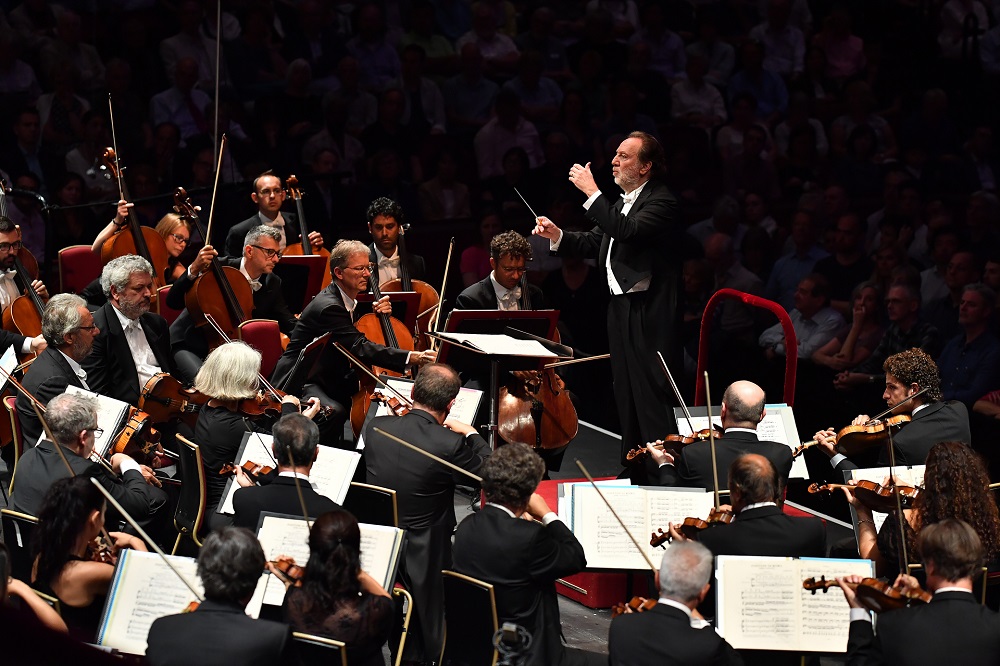Prom 54 review: Kavakos, Filarmonica della Scala, Chailly - cool Milanesi mute Roman exuberance | reviews, news & interviews
Prom 54 review: Kavakos, Filarmonica della Scala, Chailly - cool Milanesi mute Roman exuberance
Prom 54 review: Kavakos, Filarmonica della Scala, Chailly - cool Milanesi mute Roman exuberance
Bumpy Brahms and finely coloured but reserved Respighi
Last night was one of those rare occasions when I'd rather have heard Respighi's gaudy-brilliant Roman Festivals than Brahms's Violin Concerto.
Neither Chailly nor his Milanesi seemed willing to go with the special atmosphere of the Proms: what, no encore from a major visiting orchestra? After the big showpieces, Nino Rota or Verdi ballet music would have been so welcome. Yes, this team is Italian, but from the relatively chilly north. Its sophistication was obvious from the first orchestral phrases of the Brahms, dark colours beautifully blended; and when collective violins took up the great melodies and soared, they only pointed up what was missing in Kavakos's playing (the soloist pictured below). He came to life in virtuoso double-stopping; but what happened to the many cantabile passages? From where I was sitting, they sounded flat and tense, with none of the generosity and special imagination Nikolaj Znaider brought to every phrase in a magnificent Prom with Fabio Luisi and the Danish National Symphony Orchestra two years ago. From the start, there was a sense of pushing forward too much, at odds with the orchestra, even though Chailly was always there to follow him. The biggest misalliance came in the Adagio, where the melody so ineffably sung by the Scala oboist - I hesitate to say which, since two principals were listed in the programme - got bumped about in Kavakos's version. This usually great player is capable of more.
He came to life in virtuoso double-stopping; but what happened to the many cantabile passages? From where I was sitting, they sounded flat and tense, with none of the generosity and special imagination Nikolaj Znaider brought to every phrase in a magnificent Prom with Fabio Luisi and the Danish National Symphony Orchestra two years ago. From the start, there was a sense of pushing forward too much, at odds with the orchestra, even though Chailly was always there to follow him. The biggest misalliance came in the Adagio, where the melody so ineffably sung by the Scala oboist - I hesitate to say which, since two principals were listed in the programme - got bumped about in Kavakos's version. This usually great player is capable of more.
The continuity with which Chailly swept from Brahms's slow movement into the finale found the opening water-music in Fountains of Rome meandering unobtrusively through the chatter of a noisy Proms audience: refreshment currently lacking in the Italian capital now that Lake Bracciano is at an all-time low and the fountains have been switched off. Respighi's more than just picture-postcard depiction of Roman dawn and sunset can rarely have sounded more layered or exquisite. But we needed more of a Triton-blast from the horns in the second picture, and the Trevi procession stayed light and swift. Would Chailly unleash more in Pines of Rome? Still not enough in the chatter and songs of ragazzi in the Villa Borghese; nor was the contrast of catacomb mystery as magical as Stéphane Denève and the Royal Scottish National Orchestra had made it in another unforgettable past Prom. But the distant solo trumpet, perfectly vibratoed, sounded supremely exquisite, and so, too, were the wind solos on the Janiculum, not to be outdone by the recorded nightingale rippling round the hall.
Would Chailly unleash more in Pines of Rome? Still not enough in the chatter and songs of ragazzi in the Villa Borghese; nor was the contrast of catacomb mystery as magical as Stéphane Denève and the Royal Scottish National Orchestra had made it in another unforgettable past Prom. But the distant solo trumpet, perfectly vibratoed, sounded supremely exquisite, and so, too, were the wind solos on the Janiculum, not to be outdone by the recorded nightingale rippling round the hall.
Never mind that we didn't get six saxhorns for the extra cohorts of the Roman army processing down the Appian Way; the standard brass ensemble on high still delivered the necessary frisson. With its organ pedals and its ensembles threatening to overwhelm most venues, the military denouement of Pines is as much a Proms institution as Holst's The Planets. If only there had been more thrills throughout this concert - and Prommers should not forgive the lack of an encore (recent light shed on a late arrival and rehearsal - see comments below - suggest a more forgiving spirit, but still doesn't entirely explain the lack). For an orchestra from abroad to refuse it is seriously to misjudge the spirit of place.
rating
Share this article
Add comment
The future of Arts Journalism
You can stop theartsdesk.com closing!
We urgently need financing to survive. Our fundraising drive has thus far raised £49,000 but we need to reach £100,000 or we will be forced to close. Please contribute here: https://gofund.me/c3f6033d
And if you can forward this information to anyone who might assist, we’d be grateful.

Subscribe to theartsdesk.com
Thank you for continuing to read our work on theartsdesk.com. For unlimited access to every article in its entirety, including our archive of more than 15,000 pieces, we're asking for £5 per month or £40 per year. We feel it's a very good deal, and hope you do too.
To take a subscription now simply click here.
And if you're looking for that extra gift for a friend or family member, why not treat them to a theartsdesk.com gift subscription?
more Classical music
 Hallé John Adams festival, Bridgewater Hall / RNCM, Manchester review - standing ovations for today's music
From 1980 to 2025 with the West Coast’s pied piper and his eager following
Hallé John Adams festival, Bridgewater Hall / RNCM, Manchester review - standing ovations for today's music
From 1980 to 2025 with the West Coast’s pied piper and his eager following
 Kaploukhii, Greenwich Chamber Orchestra, Cutts, St James's Piccadilly review - promising young pianist
A robust and assertive Beethoven concerto suggests a player to follow
Kaploukhii, Greenwich Chamber Orchestra, Cutts, St James's Piccadilly review - promising young pianist
A robust and assertive Beethoven concerto suggests a player to follow
 Robin Holloway: Music's Odyssey review - lessons in composition
Broad and idiosyncratic survey of classical music is insightful but slightly indigestible
Robin Holloway: Music's Odyssey review - lessons in composition
Broad and idiosyncratic survey of classical music is insightful but slightly indigestible
 Classical CDs: Wolf-pelts, clowns and social realism
British ballet scores, 19th century cello works and contemporary piano etudes
Classical CDs: Wolf-pelts, clowns and social realism
British ballet scores, 19th century cello works and contemporary piano etudes
 Bizet in 150th anniversary year: rich and rare French offerings from Palazzetto Bru Zane
Specialists in French romantic music unveil a treasure trove both live and on disc
Bizet in 150th anniversary year: rich and rare French offerings from Palazzetto Bru Zane
Specialists in French romantic music unveil a treasure trove both live and on disc
 Scottish Chamber Orchestra, Ibragimova, Queen’s Hall, Edinburgh review - rarities, novelties and drumrolls
A pity the SCO didn't pick a better showcase for a shining guest artist
Scottish Chamber Orchestra, Ibragimova, Queen’s Hall, Edinburgh review - rarities, novelties and drumrolls
A pity the SCO didn't pick a better showcase for a shining guest artist
 Kilsby, Parkes, Sinfonia of London, Wilson, Barbican review - string things zing and sing in expert hands
British masterpieces for strings plus other-worldly tenor and horn - and a muscular rarity
Kilsby, Parkes, Sinfonia of London, Wilson, Barbican review - string things zing and sing in expert hands
British masterpieces for strings plus other-worldly tenor and horn - and a muscular rarity
 From Historical to Hip-Hop, Classically Black Music Festival, Kings Place review - a cluster of impressive stars for the future
From quasi-Mozartian elegance to the gritty humour of a kitchen inspection
From Historical to Hip-Hop, Classically Black Music Festival, Kings Place review - a cluster of impressive stars for the future
From quasi-Mozartian elegance to the gritty humour of a kitchen inspection
 Shibe, LSO, Adès, Barbican review - gaudy and glorious new music alongside serene Sibelius
Adès’s passion makes persuasive case for the music he loves, both new and old
Shibe, LSO, Adès, Barbican review - gaudy and glorious new music alongside serene Sibelius
Adès’s passion makes persuasive case for the music he loves, both new and old
 Anja Mittermüller, Richard Fu, Wigmore Hall review - a glorious hall debut
The Austrian mezzo shines - at the age of 22
Anja Mittermüller, Richard Fu, Wigmore Hall review - a glorious hall debut
The Austrian mezzo shines - at the age of 22
 First Person: clarinettist Oliver Pashley on the new horizons of The Hermes Experiment's latest album
Compositions by members of this unusual quartet feature for the first time
First Person: clarinettist Oliver Pashley on the new horizons of The Hermes Experiment's latest album
Compositions by members of this unusual quartet feature for the first time

Comments
Had something happened that
Yes. They were very pushed
As a spectator at the hall, I
As a member of the audience, I was unaware of any of this until someone told me about it this evening (radio listeners had apparently been informed). The concert started on time, not half an hour later, so nothing seemed amiss. Unless an announcement is made at a concert, the duty is to report how the performance works, taken at face value. And since there was no delay in the performance itself, that wouldn't explain the absence of an encore from either soloist or orchestra.
On the issue of a late arrival, an orchestra - indeed, in my opinion, all performers collectively or individually - should not be expected to play on the same day as the flight. Part of the overpacked tour schedules which I'm afraid must be blamed squarely on managers/agents.
I was there in the arena and
Odd - I noticed no delay,
Odd - I noticed no delay, which suggests it could only have been a matter of minutes. No-one was shifting or muttering around me. Anyway, glad you enjoyed the Brahms more than I did.
I was sitting behind the